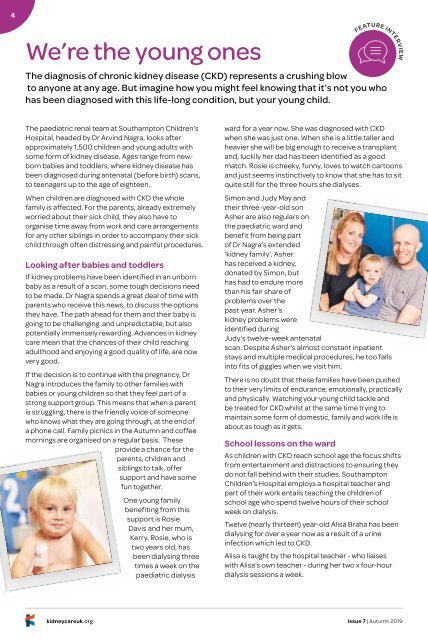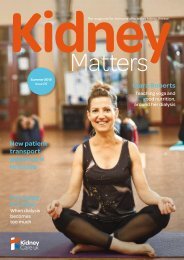Kidney Matters - Issue 7 Autumn 2019
Kidney Matters is our free quarterly magazine for everyone affected by kidney disease. This issue includes a delicious mexico bean nacho recipe from our Kidney Kitchen as well as articles about dialysis away from base, kidney stones, and a feature on looking out for children and young people with kidney disease. We know that being a kidney patient can be tough at times and that accessing the right help at the right time isn’t always easy. We’ve spent a great deal of time over the past year talking to kidney patients on dialysis, asking them what we can do to address this. The response was overwhelmingly ‘improved communication’ on what is going on in the kidney world and what is available to them in terms of support and how to access it. Kidney Matters has been developed to tackle this as well as the many other issues kidney patients face in day-to-day life. Along with shared patient experiences, Kidney Matters provides on how to access emotional and practical support, financial assistance through our grant schemes, advice from leading kidney specialists and tips on how to keep as well as possible by eating a healthy diet whilst on dialysis.
Kidney Matters is our free quarterly magazine for everyone affected by kidney disease.
This issue includes a delicious mexico bean nacho recipe from our Kidney Kitchen as well as articles about dialysis away from base, kidney stones, and a feature on looking out for children and young people with kidney disease.
We know that being a kidney patient can be tough at times and that accessing the right help at the right time isn’t always easy. We’ve spent a great deal of time over the past year talking to kidney patients on dialysis, asking them what we can do to address this. The response was overwhelmingly ‘improved communication’ on what is going on in the kidney world and what is available to them in terms of support and how to access it.
Kidney Matters has been developed to tackle this as well as the many other issues kidney patients face in day-to-day life. Along with shared patient experiences, Kidney Matters provides on how to access emotional and practical support, financial assistance through our grant schemes, advice from leading kidney specialists and tips on how to keep as well as possible by eating a healthy diet whilst on dialysis.
You also want an ePaper? Increase the reach of your titles
YUMPU automatically turns print PDFs into web optimized ePapers that Google loves.
4<br />
We’re the young ones<br />
FEATURE INTERVIEW<br />
The diagnosis of chronic kidney disease (CKD) represents a crushing blow<br />
to anyone at any age. But imagine how you might feel knowing that it’s not you who<br />
has been diagnosed with this life-long condition, but your young child.<br />
The paediatric renal team at Southampton Children’s<br />
Hospital, headed by Dr Arvind Nagra, looks after<br />
approximately 1,500 children and young adults with<br />
some form of kidney disease. Ages range from newborn<br />
babies and toddlers, where kidney disease has<br />
been diagnosed during antenatal (before birth) scans,<br />
to teenagers up to the age of eighteen.<br />
When children are diagnosed with CKD the whole<br />
family is affected. For the parents, already extremely<br />
worried about their sick child, they also have to<br />
organise time away from work and care arrangements<br />
for any other siblings in order to accompany their sick<br />
child through often distressing and painful procedures.<br />
Looking after babies and toddlers<br />
If kidney problems have been identified in an unborn<br />
baby as a result of a scan, some tough decisions need<br />
to be made. Dr Nagra spends a great deal of time with<br />
parents who receive this news, to discuss the options<br />
they have. The path ahead for them and their baby is<br />
going to be challenging and unpredictable, but also<br />
potentially immensely rewarding. Advances in kidney<br />
care mean that the chances of their child reaching<br />
adulthood and enjoying a good quality of life, are now<br />
very good.<br />
If the decision is to continue with the pregnancy, Dr<br />
Nagra introduces the family to other families with<br />
babies or young children so that they feel part of a<br />
strong support group. This means that when a parent<br />
is struggling, there is the friendly voice of someone<br />
who knows what they are going through, at the end of<br />
a phone call. Family picnics in the <strong>Autumn</strong> and coffee<br />
mornings are organised on a regular basis. These<br />
provide a chance for the<br />
parents, children and<br />
siblings to talk, offer<br />
support and have some<br />
fun together.<br />
One young family<br />
benefiting from this<br />
support is Rosie<br />
Davis and her mum,<br />
Kerry. Rosie, who is<br />
two years old, has<br />
been dialysing three<br />
times a week on the<br />
paediatric dialysis<br />
ward for a year now. She was diagnosed with CKD<br />
when she was just one. When she is a little taller and<br />
heavier she will be big enough to receive a transplant<br />
and, luckily her dad has been identified as a good<br />
match. Rosie is cheeky, funny, loves to watch cartoons<br />
and just seems instinctively to know that she has to sit<br />
quite still for the three hours she dialyses.<br />
Simon and Judy May and<br />
their three-year-old son<br />
Asher are also regulars on<br />
the paediatric ward and<br />
benefit from being part<br />
of Dr Nagra’s extended<br />
‘kidney family’. Asher<br />
has received a kidney,<br />
donated by Simon, but<br />
has had to endure more<br />
than his fair share of<br />
problems over the<br />
past year. Asher’s<br />
kidney problems were<br />
identified during<br />
Judy’s twelve-week antenatal<br />
scan. Despite Asher’s almost constant inpatient<br />
stays and multiple medical procedures, he too falls<br />
into fits of giggles when we visit him.<br />
There is no doubt that these families have been pushed<br />
to their very limits of endurance; emotionally, practically<br />
and physically. Watching your young child tackle and<br />
be treated for CKD whilst at the same time trying to<br />
maintain some form of domestic, family and work life is<br />
about as tough as it gets.<br />
School lessons on the ward<br />
As children with CKD reach school age the focus shifts<br />
from entertainment and distractions to ensuring they<br />
do not fall behind with their studies. Southampton<br />
Children’s Hospital employs a hospital teacher and<br />
part of their work entails teaching the children of<br />
school age who spend twelve hours of their school<br />
week on dialysis.<br />
Twelve (nearly thirteen) year-old Alisa Braha has been<br />
dialysing for over a year now as a result of a urine<br />
infection which led to CKD.<br />
Alisa is taught by the hospital teacher - who liaises<br />
with Alisa’s own teacher - during her two x four-hour<br />
dialysis sessions a week.<br />
kidneycareuk.org <strong>Issue</strong> 7 | <strong>Autumn</strong> <strong>2019</strong>

















